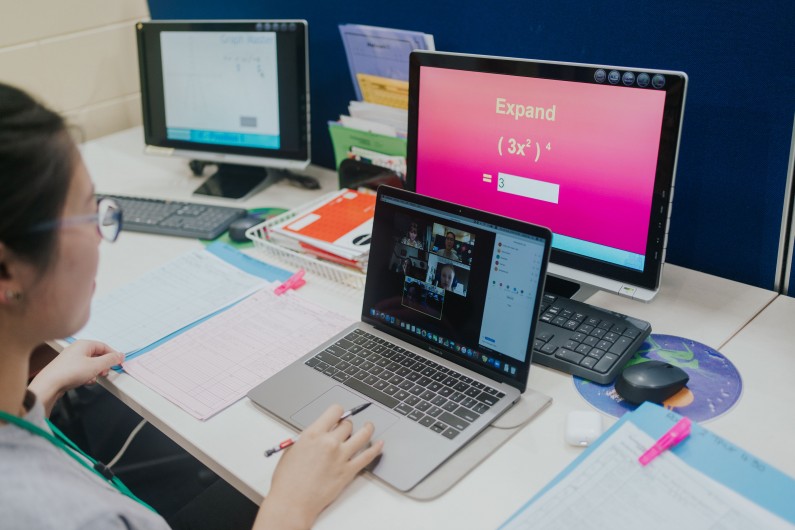4 Do’s and Don'ts for Online Learning

As a parent of primary school or high school children, you have likely experienced a move to online learning from home by now, or are facing a second adjustment to a return to lock down measures. If you’re making the switch to online learning, you certainly aren’t alone. If you haven't already, preparing for a situation where your child is moved to online learning can help to save a lot of time and get your family adjusted to balancing school work with tuition.
Even with a plan, does learning from home and online feel like a big change for the family compared to at a centre and in class? We’ve created ways that can guide you to get the most from this new way of learning. Check out the 4 Do’s and Don’ts of balancing online tuition and schooling below:
1. DO Create a written schedule for school work and tuition
You have probably seen plenty of schedules already, but the key is to allocate time to each group of activity - school work, play, and tuition study, for example, to show the importance of both. Colour coding really helps here!
We know that children need and respond well to structure and routine. Factoring in different colour slots and framing language where your child ‘gets’ to complete their reading, their maths school work and then have time to play will be seen as an opportunity rather than a burden. Making sure to include times for play and fun activities say in yellow, means that they can recognise the times to focus are coming up. Online tuition will most likely be at an after school time, so showing that play or dinner can be enjoyed after this is complete is another great habit builder.
Starting your family’s daily learning schedule from 8:30-9am every morning and ensuring that study is finished by 5.30-6pm for example, means there is an overall balance for the whole family.

2. DO Take study breaks away from screens
Focusing for long periods of time is challenging enough, let alone from within the same room for most of the day. If there is little variety, productivity can slide quickly, and a lost sense of achievement can then follow soon after.
While the computer might not be easy to move, and dedicating a study space helps children to concentrate on their set tasks, the activities surrounding this can be rotated in different parts of the house.
When taking a break and enjoying the well-earned play time, consider sitting outside for some fresh air, or even better, enjoying exercise. Even if it's just having a walk around the neighbourhood or bouncing a basketball, this will go a long way! You’ll likely find study is easier and sleep is restful too.

3. DON’T be afraid to ask teachers and tutors questions
Much of the technology and resources available to students as part of online learning is dedicated to facilitating teacher-student interaction. Asking questions of teachers and tutors is the place where students form invaluable parts of their knowledge, and is essential for student engagement. Prompt feedback can dramatically boost confidence, when a child feels that they are guided on the right path with their learning.
Checking with your child’s teacher on the preferred way to communicate during the day is a great start - is a phone call welcomed or is there an instant chat set up online?
When in an online tutoring session with a group of other students, should your child ask questions in real time, or submit a question in a Q&A section to avoid distracting others? In the same way, your child might prefer to hear comments and feedback from their teacher or tutor at the end of the task they’re attempting. Quietly consulting your teacher and tutor after the online class might be a helpful way to connect rather than through a private email.
Once agreeing to the preferred way to communicate, your child’s progress will soar!

4. DON’T get distracted on your computer
As a general rule, it is important that you take the same approach to online learning that you would in-class. This means that you should not have other activities happening when it is time to learn. If you notice there is ‘just checking’ on sports scores happening when on other websites, or when the TV is on, or that feeding the family pet becomes an idea as a class is about to start, now is the time to explain that these tasks can be scheduled into free time outside of what is the important class time.
Some students might be tempted to multi-task, where they are sitting in a class and wanting to complete some homework or tuition prep at the same time. This is proven to be ineffective, and what knowledge the student will try to absorb simply won’t go in.

How does NumberWorks’nWords’ online tutoring work?
At NumberWorks’nWords, the team have embraced online tuition, so that children can continue to make progress while meeting with our fantastic tutors and mentors via video conference. Online tuition is simple to get set up with, and we are able to send you all the resources you will need digitally.
Online tutoring is delivered by the same team of expert tutors who teach in our centres. During an online session, tutors will take up to 4 pupils into a virtual breakout room to work with them on their individually tailored programs. While classes are running, the manager will move from room to room to check that each session is going smoothly. With online tutoring, we continue to provide the same high level of one on one engagement and the fun element of our tutoring model.
If you are worried about COVID-19’s impact on your child’s learning, get in touch with your local centre or book a free assessment today.



